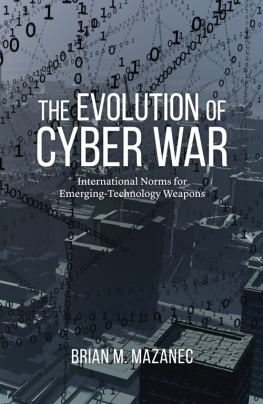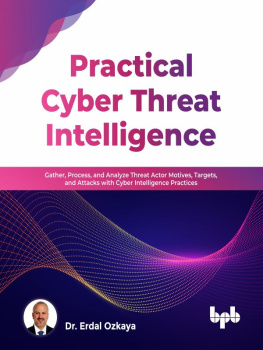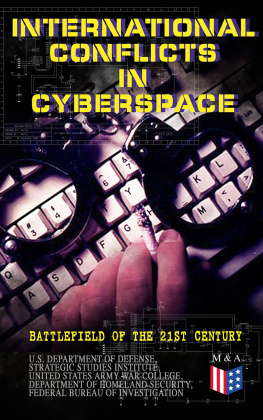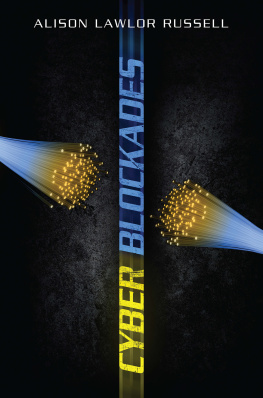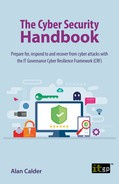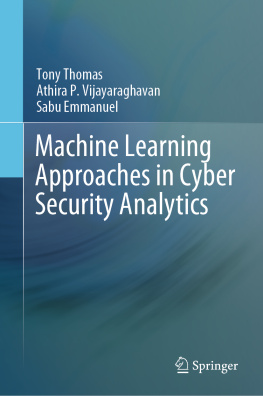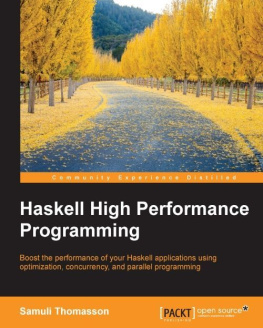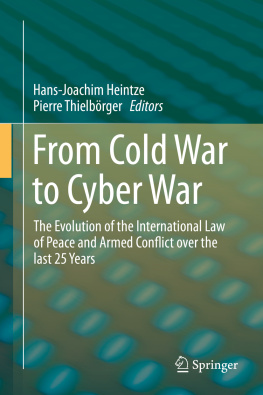Samuli Haataja - Cyber Attacks and International Law on the Use of Force
Here you can read online Samuli Haataja - Cyber Attacks and International Law on the Use of Force full text of the book (entire story) in english for free. Download pdf and epub, get meaning, cover and reviews about this ebook. year: 2019, publisher: Routledge, genre: Politics. Description of the work, (preface) as well as reviews are available. Best literature library LitArk.com created for fans of good reading and offers a wide selection of genres:
Romance novel
Science fiction
Adventure
Detective
Science
History
Home and family
Prose
Art
Politics
Computer
Non-fiction
Religion
Business
Children
Humor
Choose a favorite category and find really read worthwhile books. Enjoy immersion in the world of imagination, feel the emotions of the characters or learn something new for yourself, make an fascinating discovery.

- Book:Cyber Attacks and International Law on the Use of Force
- Author:
- Publisher:Routledge
- Genre:
- Year:2019
- Rating:3 / 5
- Favourites:Add to favourites
- Your mark:
- 60
- 1
- 2
- 3
- 4
- 5
Cyber Attacks and International Law on the Use of Force: summary, description and annotation
We offer to read an annotation, description, summary or preface (depends on what the author of the book "Cyber Attacks and International Law on the Use of Force" wrote himself). If you haven't found the necessary information about the book — write in the comments, we will try to find it.
Cyber Attacks and International Law on the Use of Force — read online for free the complete book (whole text) full work
Below is the text of the book, divided by pages. System saving the place of the last page read, allows you to conveniently read the book "Cyber Attacks and International Law on the Use of Force" online for free, without having to search again every time where you left off. Put a bookmark, and you can go to the page where you finished reading at any time.
Font size:
Interval:
Bookmark:
Examining the thematic intersection of law, technology, and violence, this book explores cyber attacks against states and current international law on the use of force. The theory of information ethics is used to critique the laws conception of violence and to develop an informational approach as an alternative way in which to think about cyber attacks.
Cyber attacks against states constitute a new form of violence in the information age, and international law on the use of force is limited in its capacity to regulate them. This book draws on Luciano Floridis theory of information ethics to critique the narrow conception of violence embodied in the law and to develop an alternative way to think about cyber attacks, violence, and the state. The author uses three case studies the 2007 cyber attacks against Estonia, the Stuxnet incident involving Iran that was discovered in 2010, and the cyber attacks used as part of the Russian interference in the 2016 US presidential election to demonstrate that an informational approach offers a means to reimagine the state as an entity and cyber attacks as a form of violence against it.
This interdisciplinary approach will appeal to an international audience of scholars in international law, international relations, security studies, cyber security, and anyone interested in the issues surrounding emerging technologies.
Samuli Haataja is an academic at Griffith Law School, Griffith University, where he teaches across a range of courses on public international law. His research explores the intersection of law and technology in the context of international law and emerging technologies, and he has published in various journals including Law, Innovation and Technology and the Cambridge International Law Journal. Dr Haataja is also a member of the Program on the Regulation of Emerging Military Technologies (PREMT) and the Institute of Electrical and Electronics Engineers Society on Social Implications of Technology (IEEE SSIT).
Emerging Technologies, Ethics and International Affairs
Steven Barela, Jai C. Galliott, Avery Plaw, Katina Michael
This series examines the crucial ethical, legal and public policy questions arising from or exacerbated by the design, development and eventual adoption of new technologies across all related fields, from education and engineering to medicine and military affairs. The books revolve around two key themes:
Moral issues in research, engineering and design
Ethical, legal and political/policy issues in the use and regulation of technology
This series encourages submission of cutting-edge research monographs and edited collections with a particular focus on forward-looking ideas concerning innovative or as yet undeveloped technologies. Whilst there is an expectation that authors will be well grounded in philosophy, law or political science, consideration will be given to future-orientated works that cross these disciplinary boundaries. The interdisciplinary nature of the series editorial team offers the best possible examination of works that address the ethical, legal and social implications of emerging technologies.
Technology, Ethics and the Protocols of Modern War
Edited by Artur Gruszczak and Pawe Frankowski
Emerging Technologies in Diverse Forensic Sciences
Ronn Johnson
Cyber Attacks and International Law on the Use of Force
The Turn to Information Ethics
Samuli Haataja
For more information about this series, please visit https://www.routledge.com/Emerging-Technologies-Ethics-and-International-Affairs/book-series/ASHSER1408
First published 2019
by Routledge
2 Park Square, Milton Park, Abingdon, Oxon OX14 4RN
and by Routledge
52 Vanderbilt Avenue, New York, NY 10017
Routledge is an imprint of the Taylor & Francis Group, an informa business
2019 Samuli Haataja
The right of Samuli Haataja to be identified as author of this work has been asserted by him in accordance with sections 77 and 78 of the Copyright, Designs and Patents Act 1988.
All rights reserved. No part of this book may be reprinted or reproduced or utilised in any form or by any electronic, mechanical, or other means, now known or hereafter invented, including photocopying and recording, or in any information storage or retrieval system, without permission in writing from the publishers.
Trademark notice: Product or corporate names may be trademarks or registered trademarks, and are used only for identification and explanation without intent to infringe.
British Library Cataloguing-in-Publication Data
A catalogue record for this book is available from the British Library
Congress Cataloging-in-Publication Data
Names: Haataja, Samuli, author.
Title: Cyber attacks and international law on the use of force: the turn to information ethics / Samuli Haataja.
Description: Abingdon, Oxon; New York, NY: Routledge, 2019. | Series: Emerging technologies, ethics and international affairs | Based on authors thesis (doctoral - Griffith University, Brisbane, Australia, 2017). | Includes bibliographical references and index.
Identifiers: LCCN 2018041741
Subjects: LCSH: Information warfare (International law) | Cyberspace operations (Military science)
Classification: LCC KZ6718 .H32 2019 | DDC 341.6/3dc23
LC record available at https://lccn.loc.gov/2018041741
ISBN: 978-1-138-48270-8 (hbk)
ISBN: 978-1-351-05702-8 (ebk)
Typeset in Times New Roman
by codeMantra
This book is dedicated to you, the reader.
This book was completed around the same time that my wife gave birth to our first child, Luka. Needless to say, it has been an exciting time in our lives in more ways than one. This book developed from my PhD research, which I completed at Griffith Law School, Griffith University. Like any major project extending over numerous years, I could not have done it alone, and I owe a debt of gratitude to a number of people who have helped me along the way. In particular, I thank Kieran Tranter and Afshin Akhtar-Khavari, who supervised my PhD research and provided valuable feedback throughout this project. I am also thankful to numerous other scholars at both Griffith University and the University of Helsinki who, through discussions and mentoring, have contributed to the development of my ideas and the overall shape of my book. I also owe gratitude to Tim McCormack and Ugo Pagallo for reviewing my original PhD and providing comments and feedback helpful for the development of this book, and to Rain Liivoja and Lyria Bennett Moses for providing me with numerous opportunities to engage with others working in the field of law and technology. Finally, my gratitude goes to my friends, family, and, most importantly, my wife Karen without her support and encouragement, I would not have been able to complete this project.
Material from parts of this book has also been published elsewhere and reappears here with permission. An article based on has been published as Samuli Haataja and Afshin Akhtar-Khavari, Stuxnet and international law on the use of force: An informational approach (2018) 7(1) Cambridge International Law Journal 99.
APT | Advanced Persistent Threat |
ASIO | Australian Security and Intelligence Organization |
CERT | Computer Emergency Response Team |
CIA | Central Intelligence Agency |
DDoS |
Font size:
Interval:
Bookmark:
Similar books «Cyber Attacks and International Law on the Use of Force»
Look at similar books to Cyber Attacks and International Law on the Use of Force. We have selected literature similar in name and meaning in the hope of providing readers with more options to find new, interesting, not yet read works.
Discussion, reviews of the book Cyber Attacks and International Law on the Use of Force and just readers' own opinions. Leave your comments, write what you think about the work, its meaning or the main characters. Specify what exactly you liked and what you didn't like, and why you think so.

